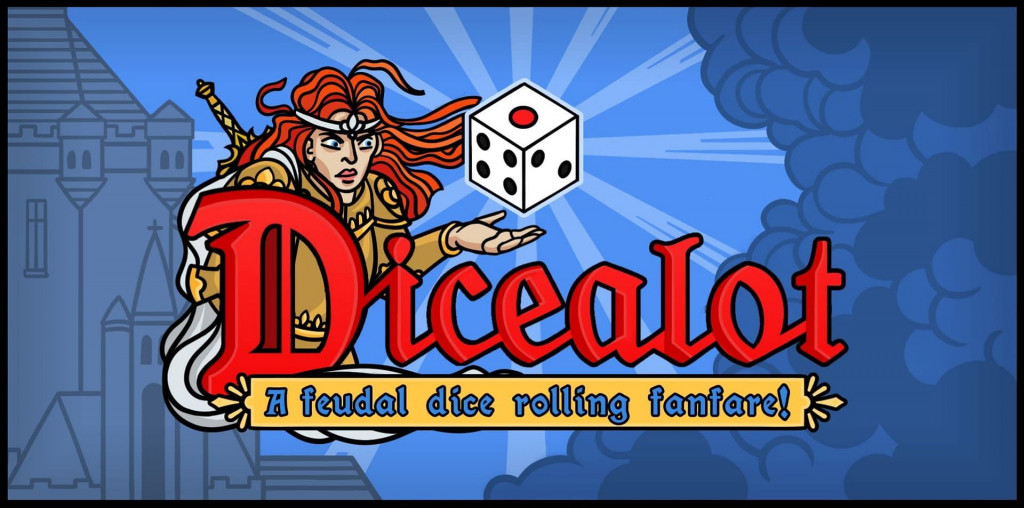There’s something about dice in video games that always gets my heart rolling. Maybe it’s the nostalgia of tabletop games, maybe it’s the thrill of chance, or maybe it’s just that sound when a perfect roll hits the table and you know fortune’s finally decided to stop mocking you. Whatever it is, Dicealot out now on Steam by Goodview Games, published by Yogscast Games, leans all in on that satisfying roll.
Dicealot a lot of dice, a lot of rolls
It’s genuinely great seeing Yogscast continue their support for quirky indie gems. They’ve built a bridge between creators and gamers that feels refreshingly genuine, and Dicealot fits that ethos perfectly. With a charming, risk-filled romp through Camelot where luck, logic, and laughter all share the same pint. Tell us in the comments below which creator–game crossover you’d most love to see next. Personally, I’m holding out for Brian Blessed narrating a roguelike about shouting at clouds.
Gameplay
Dicealot throws you straight into the thick of it. You’re a medieval hero (of sorts) journeying across a wonderfully daft version of Camelot, facing knights, monsters, and a suspicious number of creatures that look like they’ve wandered in from a tavern brawl.
The opening tutorial deserves praise. It’s simple, clean, and does a great job of explaining the basics without overwhelming you. You’ll learn quickly that victory comes from whittling down your opponent’s health to zero. But, you can’t attack whenever you fancy. You must first build power, and that’s done through rolling dice, blending Yahtzee with a fight to the death. You start with six dice, and each roll gives you a shot at forming combos. These combinations fuel your attacks. There’s even a Combo Book you can open at any time to check what’s what, which is perfect for when your brain forgets whether “Albion road” can defeat the “Troubadour Six”.
But, if you roll and hit no valid combo, you’ll suffer what’s called a Farkle. This ends your turn and leaves you open to attack. It’s a cruel, hilarious little mechanic that had me muttering “No Farkle, no Farkle…” into my monitor more times than I care to admit. It’s the kind of risk/reward tension that roguelike fans live for. Even after a few dozen Farkles, I kept coming back. There’s something undeniably addictive about seeing how far you can push your luck before the dice gods decide they’ve had enough of you.
Manage to score across all six dice, though, and you’ll trigger a Rollover, banking your power and taking another go before the enemy even blinks. Stack enough Rollovers and you’ll feel unstoppable, until, of course, probability decides to humble you again. The real trick here is keeping as many dice active on the board as possible. Landing fives and ones is the trick. They’re your lifeline for sustaining momentum and stacking buffs. So, when you find dice that guarantee those numbers, you’ve essentially hit the jackpot. It’s a golden strategy that keeps you rolling, often quite literally, toward victory.
Of course, all that strategy can crumble in an instant thanks to Dicealot’s chaotic buff and debuff system. The Quest Dice offer positive and negative modifiers, and while it’s fun when they work in your favour, the odds can turn brutally fast. If you start stacking debuffs like 0.6PWR, your damage output shrivels until your attacks barely make a dent. Entering Act 2 ramps up this cruelty to near-sadistic levels. The difficulty spike is steep; enemies hit harder, debuffs stack nastier, and one unlucky roll can send your entire run crashing down.
Fortunately, you’re fully healed upon entering Act 2, and beyond which is a small mercy. But if you die there, you’ll have to start all over again from Act 1, and it’s just as punishing the next time. You can’t simply restart the failed fight; you have to relive the whole journey. That’s when you start realising Dicealot is more luck than strategy, testing patience as much as probability.
Between fights, you’ll meet a range of merchants, each offering new dice, buffs, or equipment. The Vassal Merchant is the easiest to understand: buy a banner, get a buff. Simple, satisfying, and straight to the point. Right alongside them sits the Power Vendor, who deals in specialised dice that dramatically alter your playstyle. You might find a die filled mostly with fives for easy combos or one that only rolls threes and sixes, demanding a more tactical approach. You also have the fortune vendor who can give you health, gold or level up your dice for harder hits. The Quest vendor who gives you the special buff/debuff dice. Then a Union vendor who has the power and quest dice. You do not always get each of them showing up, sometimes just 1 or 2.
These unique designs look noticeably different from your standard dice, a little odd at first glance, almost abstract in their markings, but hovering over them neatly reveals the exact number layout. It’s a clever idea, even if your eyes need a moment to adjust. These unique dice can make or break a run, especially when you’re hunting for reliable rolls that keep your buffs alive and your power surging. It was not clear at first how to swap out dice though, so first time buying dice. I just moved on, but I did learn if you hold the dice you purchased over your other dice it will get rid of that one and replace it.
Graphics and Audio
Dicealot is half gorgeous, half puzzling. The artwork itself is brimming with personality and medieval charm. The illustrations ooze character, with lush menus and beautifully rendered dice that make you want to reach through the screen and rattle them in your palm. But the battle backgrounds? Not so much. They’re disappointingly static, just a black backdrop with faint white outlines of buildings or weapons scrolling lazily across it. There’s no real motion from you or your enemies, just a subtle slide toward one another when attacking, Pokémon-style. It does the job but lacks the energy the rest of the design radiates.
The music, too, starts strong but wears thin quickly. Those cheerful lute strums and trumpet flourishes are delightful for the first few rounds, but since you’re forced to listen to the same track repeatedly until you complete an act, it soon becomes background noise in the worst way. While there are new tracks for each Act and path you take, a few more tracks or transitions would’ve gone a long way to keeping things fresh.
There’s some light voice acting. Merchants will greet you with a cheery “hello,” and enemies have a handful of utterances. It’s nothing deep or story-heavy, but it adds a touch of personality to the proceedings alongside the occasional retro-style beep.
Longevity
In theory, Dicealot has plenty to keep you busy. With over a hundred dice variations, ten weapon types, and more than thirty different enemies, there’s a mountain of combinations to discover. The problem is that none of it carries over between runs. Every attempt starts fresh, with your shiny collection of dice wiped clean. There is a discoveries section, though, on the main menu, so you can see if you have met every enemy, collected each dice, etc.
That’s not inherently bad; roguelikes thrive on unpredictability, but when you can’t skip early levels or keep small upgrades, it becomes a grind. Eventually, I found myself wishing the game would respect my time just a little more, rather than making me roll my way through the same first few acts repeatedly. Still, when Dicealot clicks, it really clicks. It’s a dangerously compelling loop of greed, tension, and triumph, and that’s exactly what you want from a dice-based roguelike.
Final Thoughts
Dicealot is a beautiful paradox: simple to play, yet capable of infuriating complexity the longer you roll. It’s brimming with charm, clever mechanics, and fantastic art direction, even if its repetition eventually dulls the shine. The missing polish around merchants and progression holds it back from true greatness, but when the dice start rolling in your favour, there’s nothing quite like it. It’s the sort of game that’ll have you swearing one minute and cheering the next, a cycle that’s all too easy to get lost in.
It may not save Camelot, but it’ll definitely steal your evening.
Dicealot gains the Thumb Culture Silver Award.
Disclaimer: A code was received in order to write this review.
If you want more medieval roguelite fun, check out my review for The King is Watching
YouTube | Facebook | Twitter | Instagram | Discord | Podcast

